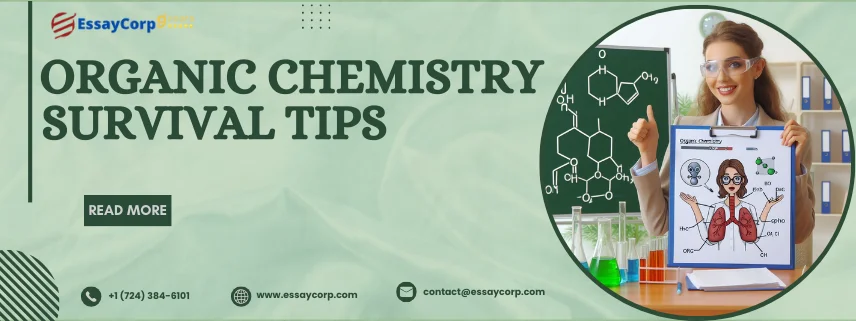Many people say that organic chemistry is the most difficult course in chemistry. It is not that it is extremely difficult, but there is a lot to learn in the lab and in the classroom, and you will need to memorize certain things in order to do well on the test. Here are some survival strategies to help you absorb the information and do well in the class.
Accept the Principles
Understand, Don’t Memorize
Organic chemistry is a moving subject that is guided by basic principles rather than controlled by memory. Basic principles like electronegativity, molecular orbital theory, and chemical bonding enable you to learn about chemical processes and predict molecular behaviour. Examine the specifics of resonance structures to gain insight into the stability and breakdown of electrons in organic compounds. Study acid-base chemistry in detail as well as the behaviours of participants and donors of protons in various chemical contexts.
Get Comfortable with the Language
Besides simple classification, organic chemistry provides an analytical and visual framework for understanding molecule structures and interactions. Learn how to accurately draw Lewis structures by focusing on bond angles and formal charge distribution. Explore the field of spectroscopy, where methods such as nuclear magnetic resonance (NMR) and infrared (IR) spectroscopy can reveal a great deal about the structure and functional groups of molecules. Being proficient in this language gives you the ability to understand complex chemical data and solve the puzzles around organic substances.
Develop a Study Strategy
Active Learning
Take an active role in learning organic chemistry by getting into idea mapping, problem solving, and collaborative learning. To develop a three-dimensional grasp of molecule geometry and stereochemistry, try out visualisation tools such as molecular modelling kits or software. Encourage a culture of curiosity by investigating applications in the real world and cross-disciplinary links, such as those in materials science and pharmaceuticals. Take on the task of synthesising complex compounds, improving your synthetic methods through experimentation.
Regular Review Sessions
Include time-management strategies in your study schedule, going over previously covered content at scheduled times to help you remember what you have learned. Use concept maps, quizzes, and cards to test yourself and embrace the power of retrieval practice. Examine other sources to expand your knowledge of advanced subjects and new developments in organic chemistry, such as research publications and review papers. Develop a growth mentality that views obstacles as chances for personal development and learning.
Make use of Resources
Use the wide range of materials at your fingertips, including peer-reviewed journals, academic conferences, online tutorials, and virtual labs. Use educational apps and digital platforms in addition to traditional textbooks and lecture notes, customising your learning to fit your unique learning preferences. Look out for mentorship opportunities with graduate students, experts in the industry, and faculty members to get experience managing the complexities of organic chemistry.
Practice
Work Through Problems
Take on a wide variety of practice challenges, from simple systems to complex synthesis puzzles. Accept the challenge of retrosynthetic analysis: breakdown target molecules into retrosynthetic stages and plan well-thought-out routes for building them. Develop your analytical abilities by analysing reaction mechanisms from a critical perspective, recognising important intermediates and transition states, and explaining the forces that fuel chemical transformations.
Understand Mechanisms
Learn to understand the basic principles that support reactivity and selectivity rather than simply remembering reaction mechanisms. Examine how molecular orbitals control reaction routes, keeping in mind how orbital overlap and symmetry combine. Examine how temperature, solvent polarity, and steric factors affect the thermodynamics and dynamics of reactions. Accept the beauty of organic synthesis as an artistic pursuit in which complex molecular structures can be built via the careful manipulation of functional groups and bond forms.
Take Care of Your Mental Health
Stay Positive
Keep a positive attitude and see obstacles as chances to develop your resilience and knowledge of organic chemistry. Appreciate the sense of wonder and fascination that come with molecular diversity and complexity. No matter how minor the stages that lead to mastery can appear, celebrate your development and succeed.
Breaks and Balance
In addition to the challenges of studying organic chemistry, give your health and self-care first priority. To refresh and regenerate your body and mind, include hobbies, physical activity, and mindfulness techniques into your everyday routine. Build a network of friends, mentors, and colleagues who will support you and understand your struggles, offering you encouragement and companionship along the way.
Use the Laboratory
Hands-On Learning
Enjoy the creative and authentic environment of the lab, where theory and practice meet. Develop your practical skills in data analysis, procedure execution, and experimental design to enhance your capacity to plan, coordinate, and conduct experiments with accuracy and precision. Recognise that science is an ongoing process and that errors and failures are simply chances for growth.
Safety First
Maintain a constant focus on safety and appropriate laboratory operations, following established guidelines and practices for the management of chemicals, tools, and waste. Learn about the characteristics and risks associated with common chemicals and solvents, and take preventative action to reduce risks and the possibility of accidents. Develop a culture of responsibility and safety awareness by realising that everyone's safety is of utmost importance in a laboratory setting.
Request Help When Needed
Make Use Of office hours
Make use of the chance to ask academic advisers, teaching assistants, and professors for guidance and help. If you have any questions or concerns about the course material, your career goals, or your personal development, schedule frequent office hours. Develop a relationship with the instructors and mentors so they can offer insightful commentary and guidance specific to your needs and objectives.
Form Study Groups
Do not hesitate to ask academic advisers, teaching assistants, and professors for advice and assistance. If you have any questions or concerns about the course material, professional objectives, or personal growth, schedule frequent office hours to get your questions and concerns answered. Establish a good rapport with the instructors and mentors, who will be able to offer helpful advice and guidance according to your objectives and needs.
Disclaimer: To be clear, this blog was generated using the assistance of an AI program. A human has reviewed, revised, supplemented, and rewritten parts of this content.
FAQs
1. How do I start understanding Organic Chemistry?
Begin by strengthening your grasp on basic concepts like structure, bonding, and functional groups. Work on visualizing molecules in 3D to understand their interactions better.
2. What study habits are effective for Organic Chemistry?
Regular study sessions, active note-taking, and consistent practice with problem-solving can significantly enhance your understanding. Flashcards can also be helpful for memorizing reactions and mechanisms.
3. How can I remember all the reactions and mechanisms?
Focus on understanding the logic and patterns behind reactions rather than rote memorization. Practice applying these patterns in various contexts to reinforce your memory.
4. Is it useful to form a study group?
Yes, study groups can provide diverse perspectives on difficult concepts, and explaining topics to others can reinforce your own understanding.
5. How important are organic chemistry lab skills?
Very. Lab skills complement your theoretical knowledge and provide hands-on experience with the reactions and techniques you learn about in lectures.



